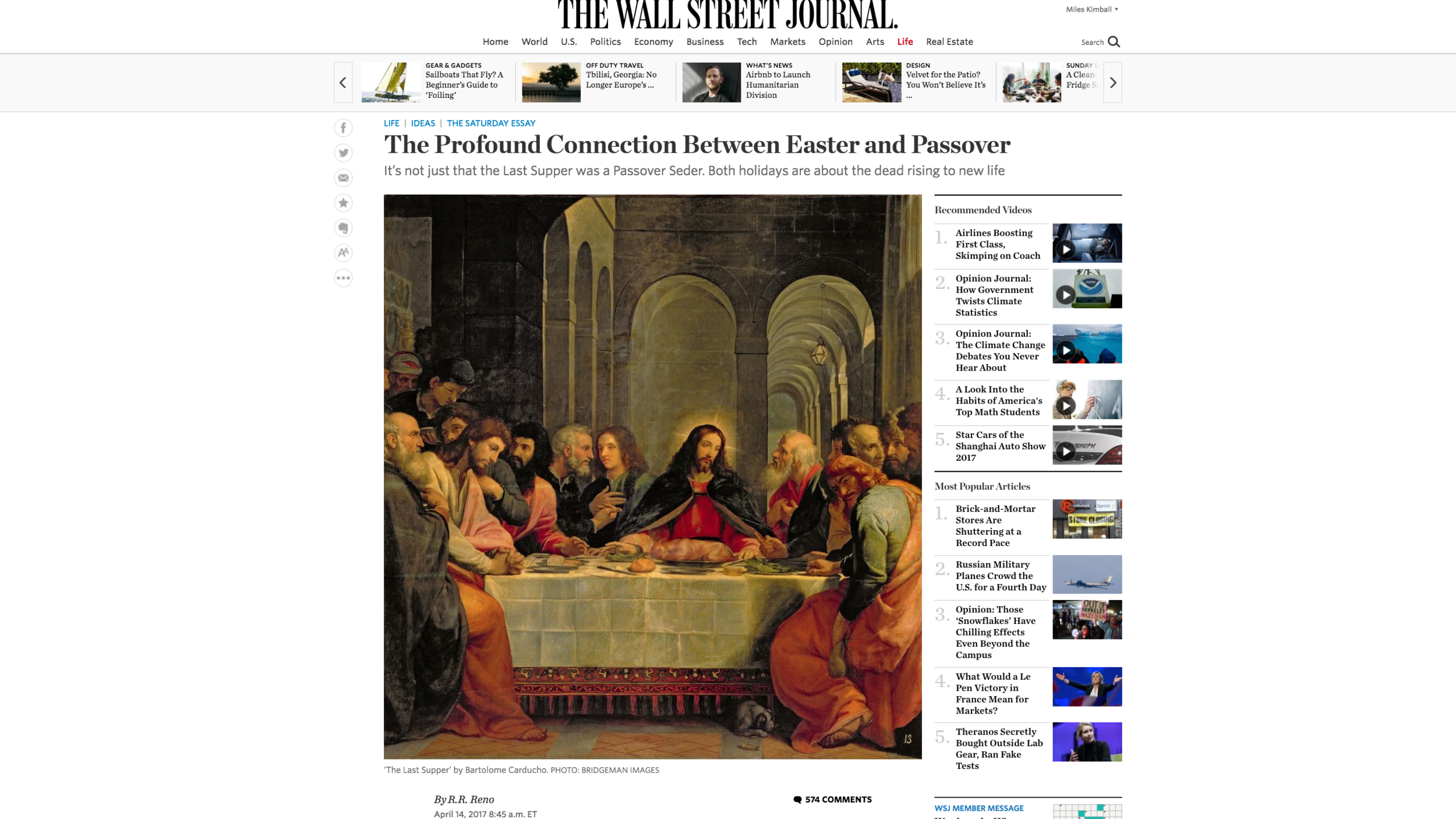Breaking the Chains
In his April 14, 2017 Wall Street Journal essay "The Profound Connection Between Easter and Passover," R. R. Reno wrote:
The Passover Seder recalls and celebrates the resurrection of the people of Israel.
Today we tend to think of slavery strictly as an injustice, which of course it is, and some modern Seders treat the Passover as the triumph of justice over oppression. But this is not the traditional view. In the ancient world, slavery was not just a hardship for individuals but a kind of communal death. An enslaved nation can survive for a time, perhaps, but they have no future. A people in bondage is slowly crushed and extinguished.
In section 17 of his 2d Treatise on Government: “On Civil Government,” John Locke makes the same comparison between being enslaved and death:
And hence it is, that he who attempts to get another man into his absolute power, does thereby put himself into a state of war with him: it being to be understood as a declaration of a design upon his life: for I have reason to conclude, that he who would get me into his power without my consent, would use me as he pleased when he had got me there, and destroy me too when he had a fancy to it; for nobody can desire to have me in his absolute power, unless it be to compel me by force to that which is against the right of my freedom, i. e. make me a slave. To be free from such force is the only security of my preservation; and reason bids me look on him, as an enemy to my preservation, who would take away that freedom which is the fence to it; so that he who makes an attempt to enslave me, thereby puts himself into a state of war with me. He that, in the state of nature, would take away the freedom that belongs to any one in that state, must necessarily be supposed to have a design to take away every thing else, that freedom being the foundation of all the rest; as he that in the state of society, would take away the freedom belonging to those of that society or commonwealth, must be supposed to design to take away from them every thing else, and so be looked on as in a state of war.
The deep reason that enslaving is like murder is that human beings have purposes. And those purposes are a large share of the meaning of their lives. Take away the freedom someone needs to accomplish and much of the meaning of their life is taken away.
Of course there are heroes of inner resistance who refuse to be slaves inwardly even when outwardly they are in chains. Some who were in Hitler's Concentration Camps managed to do this. Nelson Mandela managed to do this. And Jesus managed to do this.
On the other hand, there are many who are outwardly free, but inwardly are in chains. There are many dramatic examples of this, but I'd like to talk about a more quotidian example of inner chains I see regularly in everyday academic life among the Econ.
For most who go into academia, the salary they will get in academia is lower than they could get outside. So most who go into academia make that choice in part out of the joy of ideas, a burning desire for self-expression, a genuine fascination with learning how the world works, or out of idealism—the hope of making the world a better place through their efforts. But by the time those who are successful make it through the long grind of graduate school, getting a job and getting tenure, many have had that joy of ideas, desire for self-expression, thirst for understanding and idealism snuffed out. For many their work life has become a checklist of duties plus the narrow quest for publications in top journals. This fading away of higher, brighter goals betrays the reasons they chose academia in the first place.
For those who are still nearer the beginning than the end of the gauntlet of graduate school, getting a job and getting tenure, please make a plan for how you will keep alive through the years ahead the joy of ideas, the desire for self expression, the thirst for understanding, the idealism that burn bright within you now! Do what you need to for your career, but promise yourself that your concessions to the system will be temporary. Don't lose your soul in the process of fulfilling degree requirements, getting a job and getting tenure.
For those of you who already have tenure, and can recognize your worklife even a little bit in the description "a checklist of duties plus the narrow quest for publications in top journals," please find a way to break your inner chains before time makes them thicker and stronger! Then help others to break their chains or to steer clear of these inner chains altogether.
It is not as if publishing in top journals is in the opposite direction from the higher, brighter goals we had at the start, but as Jesus said:
Enter through the narrow gate. For wide is the gate and broad is the road that leads to destruction, and many enter through it. (Matthew 7:13)
Treating publishing in top journals as the end itself is off target. It is the broad road that leads to the destruction of much of your potential for joy, self-expression, understanding and doing good in the world. Putting the higher, brighter goals first—with publications as only one of several tools for achieving those goals—is the narrow gate to joy, self-expression, understanding and doing good.
Update April 30, 2017: I wrote a follow-up post, "Leaving a Legacy."
